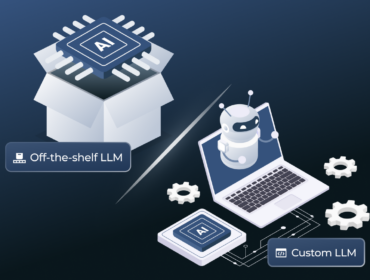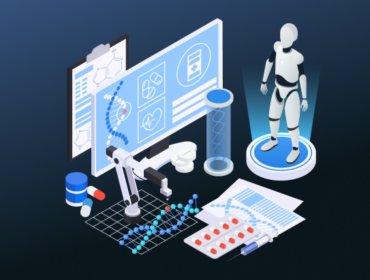Web 3.0, DeFi, and DAO are the most significant examples of how blockchain is changing the way people interact in numerous industries. In the gradually evolving Web 3.0 environment, DAOs are becoming the go-to method for launching new businesses and Web 3.0 projects. Businesses are seeking new use cases for DAO and interest is growing exponentially. DAO is a new tool that allows for reaping all the benefits of decentralized apps’ governance principles and leveraging the principles of true decentralization.
What is DAO?
A DAO stands for a decentralized autonomous organization. It has no centralized governance as it is managed by a group of users. Anyone can become a member of a DAO. You just need to invest in a few of its native currencies to become a full-fledged member. No single member can have more authority over others. They may only have more voting power. No central CEO is operating on their own whims and manipulating decisions. Everything is up for discussion and the blockchain ensures the transparency of the voting process.
DAOs are built to carry out a particular mission. This can be anything from building a company to running a fundraiser. In fact, you don’t need a reason to launch a DAO. DAOs have multiple applications across industries, from finance to gaming.
How to benefit from building a DAO?
DAOs are in an early stage of development and adoption and are set to mature over the next few years. DAOs are widely used in crypto and decentralized finance (DeFi) projects like NFT trading, borrowing and lending, and fundraising to cut out intermediaries. For example, a charity fund can raise money and receive donations from anyone without involving any central authority like a bank. Once the fundraiser is over, members can vote and decide how to spend the money.
- Smart contracts
DAOs don’t require human input to operate. Every rule is fixed by smart contracts that keep the system running.
- No need for legal status
Unlike traditional companies, DAOs don’t require legal status. They can work without it and any traditional intermediary.
- No central power
The community itself governs DAOs. There is no central entity like a CEO or board of directors that manages or regulates the organization. DAOs are decentralized and transparent.
- Low cost
A DAO is a much cheaper option since it doesn’t require any intermediaries and can be set up for free or for a relatively low fee.
What does a DAO consist of?
DAOs are fully autonomous and transparent, operating on an open-source blockchain. Any user can audit the code and check a transaction since every transaction is recorded on the blockchain. Instead of being centered around executives, DAOs are operated from the bottom and consist of the following elements:
- Developer
- User
- Validator
- Exchange

How do users vote in DAOs?
A DAO is a community-governed entity where all decisions are made based on a voting process. Here are the top three voting mechanics implemented in DAOs:
- Token-based voting
This voting mechanism is battle-tested and has a long history outside the blockchain. Each token counts for one vote. But there are some risks associated with a token-based voting mechanism, the main one being the risk of buying votes.
- Skin-in-the game voting
Probably the most challenging voting mechanism for both developers and users. It implies that when a user makes a bad choice in a DAO, all the tokens used for voting will be destroyed. But the question is how to decide whether the choice is good or bad? There aren’t any concrete answers yet.
- Proof-of-participation voting
This may be one of the fairest systems, but it also tops the list of hardest to implement. It implies that each user receives a single vote per their usage of the protocol. But there is one major difficulty; no mechanism can prevent voters from cheating by creating hundreds of wallets to get more voting power.
How to build a DAO?
Everything starts with the voting mechanism that handles proposals and votes. There are several ways to go about building a DAO but the process often begins using open-source platforms or a custom DAO from scratch. Here’s a step-by-step guide for developing a DAO:
- Define the purpose of your DAO
- Create a decentralized community
- Choose blockchain (Ethereum, Polygon, etc.)
- Boot a blockchain node
- Create a crypto wallet
- Get test tokens
- Set up an account in a DAO dApp
- Configure a template
- Tune your voting mechanism
- Run a series of tests
- Launch the DAO on the mainnet
At Unicsoft, we cover the full cycle of developing a DAO from ideation and launch to post-maintenance support. Thanks to 15 years in blockchain development, we specialize in the ins and outs of blockchain technology and can help you keep up with the latest trends.

What are DAO’s drawbacks?
DAOs are a new form of decentralized organization that is based on a blockchain. They are different from existing companies, institutions, and organizations. Though the benefits of DAOs are clear, it doesn’t mean the organizations don’t come with their own risks and challenges.
- Sluggish decision making
Every member is involved in the decision-making process. Members can take a long time to decide on project changes. This can require extra rounds of explaining an issue to members who don’t understand it, slowing down the decision-making process.
- Risk of conspiracy
Though a DAO is decentralized and democratized, decisions are made by a voter majority. However, there is still the chance of votes being bought which introduces a higher risk of conspiracy.
- Security
There is still no code that isn’t susceptible to hacking attacks. But DAOs are becoming more secure thanks to technological improvements and increased security and auditing standards.
Are there any real-life examples of DAOs?
Over the last few years, DAOs have gained massive traction and have been actively used in many blockchain-based and DeFi projects. Here are some examples to consider before launching your own DAO:
- MakerDAO
MakerDAO is an Ethereum-based peer-to-peer organization that allows people to lend and borrow crypto coins.
- Aave
Aave is a DeFi lending platform running on Ethereum.
- Uniswap
Uniswap is one of the largest crypto exchanges that gave rise to a new generation of DeFi projects.
Summing up
DAOs have great potential to change the corporate governance paradigm and break away from the conventional hierarchy system. There is no CEO, no boss, and no board of directors. Within a DAO, each member has a voting power. Once the grey area is cleared and the concept matures, DAOs will enjoy wider adoption across multiple industries.
Looking to integrate a DAO into your business processes? Unicsoft can help you build a DAO from scratch and provide assistance with smart contract development, dApp development, and wallet development. Our blockchain developers can build a wide range of decentralized platforms like a DeFi lending platform or a crypto exchange platform. Contact us to discuss the details of your next project.





![How to Build a DAO on Blockchain What’s the EU Artificial Intelligence Act and How to Comply? [Webinar]](https://unicsoft.com/wp-content/uploads/2024/03/Cover_1140_v1.1-370x280.png)

